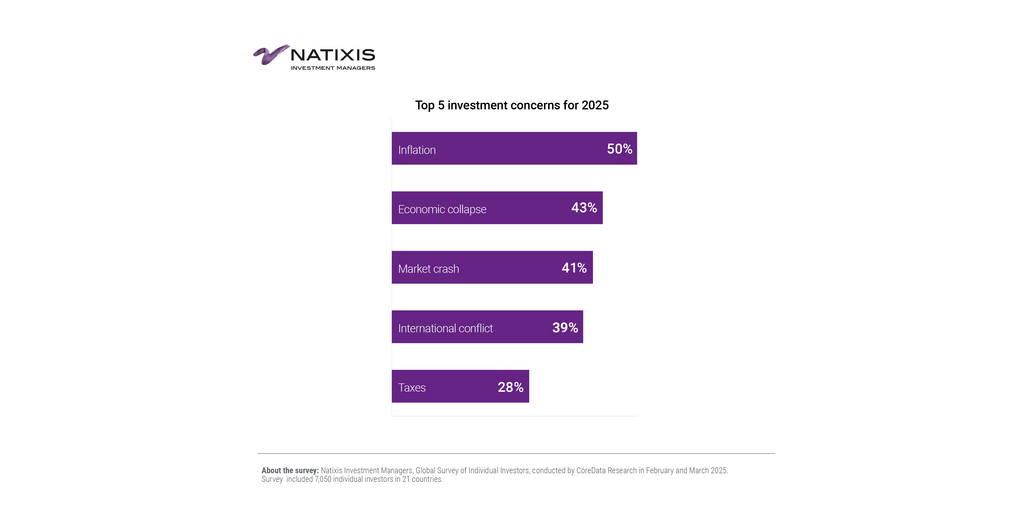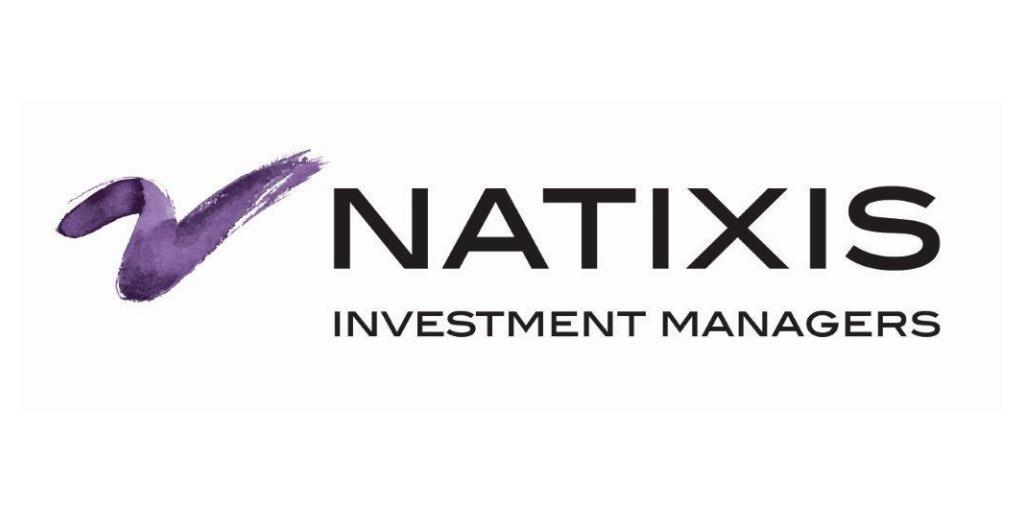- After two years of stellar market returns, U.S. investors have dialed back their expected average annual investment returns to a level that’s 21% below 2023’s level.
- 73% of U.S. investors are worried that markets are going to become still more volatile and 69% voiced concern that global instability will impact their finances. Inflation persists as the top worry, followed by market crash fears, economic collapse fears, and concerns that taxes are headed higher.
- 62% of U.S. investors say they won’t be content with just index returns and will be looking to outperform market benchmarks in 2025, highlighting a growing interest in active management and professional advice.
BOSTON--(BUSINESS WIRE)--After years of strong returns fueled by low rates and tech growth, 69% of investors now feel the world is unstable and worry about their finances, according to the 2025 Natixis Investment Managers (“Natixis IM”) Survey. Inflation, global conflict and policy uncertainty tapered U.S. investors’ return expectations from 15.6% in 2023 to 12.6% in 2025.




Natixis IM surveyed 750 U.S. individual investors between February and March 2025, who have a median of $625,000 in net investable assets and a median annual income of $200,000.
In their findings, Natixis IM found the drivers behind U.S. investors’ anxieties include:
- Inflation and Market Concerns: Despite inflation nearing central bank targets, only 26% of U.S. investors believe inflation is behind them, and 61% cite it as their top financial fear. Higher everyday costs have led 60% to save less and 57% to see investment gains eroded – figures mirrored by over half of U.S. millionaires. Additionally, 50% of investors fear a market crash.
- A Stress Test for Geopolitical and Economic Norms: High rates, low confidence, and political uncertainty have half of U.S. investors fearing economic collapse. Global conflicts add to the unease – 33% cite them as a top concern, and 69% feel the world is unstable and worry about the impact on their personal finances.
- Uncertainty Around Tax Policy: Taxes are a top concern for U.S. investors – 42% financially and 37% investment-wise. Most (77%) fear government deficits will lead to higher taxes, 66% worry about shifting tax policies and over half (51%) think they won’t benefit from U.S. tax policy changes over the next few years. Nearly 70% say they understand how taxes affect investments, and 67% prioritize after-tax returns over pre-tax gains.
Amid ongoing uncertainty, investors are focused on market volatility, with 73% expecting it to rise. Risk appetite varies: 46% identify as moderate, 37% conservative, and 16% aggressive. While 58% see volatility as a chance to grow wealth, three quarters (75%) of U.S. investors prefer to take safety over performance. Some investor caution is reflected in the narrowing gap between their return expectations and those of advisors: in 2023, investors expected 15.6% above inflation, versus 7.0% from advisors – a 123% gap. By 2025, expectations had fallen to 12.6%, narrowing the gap to 76%, although a notable divide remains.
“These findings – based on surveys conducted prior to the April tariffs – clearly underscore that investors have been sensing rising uncertainty for some time, and that those uncertainties are not likely to abate in the near term,” said Dave Goodsell, Executive Director of the Natixis Center for Investor Insights. “Investors are looking for answers and clarity about how to keep their portfolios intact while navigating the market’s challenges, and they are turning to advisors and active management to do so.”
Investors Embrace Active Strategies and Advisor Support Amid Market Uncertainty
In a volatile 2025 market, 62% of U.S. investors say they don’t want to rely solely on market returns, signaling a clear shift toward active strategies. Four in five aim to outperform the market, while 43% worry the "Magnificent 7" could drag down index performance, and 44% feel passive investing doesn’t offer enough protection.
Amid this uncertainty, U.S. investors are also placing greater trust in financial advisors; two-thirds receive professional advice, and more say they trust their advisor (96%) than themselves (89%) when making financial decisions. However, few (13%) want to fully hand over control: 23% prefer to decide independently with guidance, 36% see their advisor as a partner, and 29% want to stay involved in major decisions. Most advised U.S. investors rely on traditional advisors (68%), while 24% use a hybrid model and 9% rely solely on automation. Just 29% of U.S. investors using financial planners or hybrid advice would consider automated advice in the future—even with technological advances—highlighting broad reluctance to go fully digital.
U.S. investors working with advisors prioritize clear guidance and personalized coaching, with 49% seeking financial planning advice, 41% valuing accessibility, and 39% wanting to feel heard. Their strongest interest lies in retirement planning (61%) and broader financial planning services (52%).
Beyond these services and broad market guidance, investors are looking to advisors for help in navigating specific asset classes and strategies:
- Tax Management Strategies: Interest for tax management strategies grew from 32% in 2021 to 47% in 2025. Most (78%) view it as essential to financial planning, and 80% trust their advisor to manage their tax liability. This is driving demand for direct indexing and tax-loss harvesting through separately managed accounts.
- Bonds: Although 60% of respondents said they feel confident in their understanding of how interest rates affect bonds, only 3% correctly identified that bond prices typically rise when interest rates fall—though future income may decrease. Nearly 30% admitted they were unsure. Despite 53% currently owning bonds, just 28% intend to increase their fixed income holdings, with 60% saying they find stocks more attractive.
- Private Assets: Interest is rising in private assets (40%), but only 24% currently invest in this category. Over a third (37%) of U.S. investors say private assets are a good way to manage risk in their portfolios, and 36% say their returns are worth the associated fees. At the same time, they believe private assets are riskier than public investment (71%), and recognize they require special tax reporting (61%) and long holding periods (43%).
Interest in crypto remains limited among U.S. investors—only 13% currently invest, and 15% plan to. Most (65%) see it as speculative rather than practical. While 35% expect Bitcoin to hit new highs in 2025, just 28% have discussed it with an advisor. Still, 25% believe new vehicles like ETFs could make crypto more appealing.
Similarly, individual investors remain cautious about AI, with only 28% seeing it as the investment opportunity of a lifetime. Over half (54%) believe it's a bubble, and 49% think its risks outweigh the benefits.
This U.S. data is part of a broader survey of 7,050 individual investors across Asia, Europe/EMEA, North America, and the UK.
Full global findings from the 2025 Natixis Investment Managers Individual Investor Survey are available here: https://www.im.natixis.com/en-us/insights/investor-sentiment/2025/individual-investor-survey
Methodology
Natixis Investment Managers Individual Investor Survey conducted by CoreData Research in February and March 2025. Survey included 7,050 individual investors in 21 countries throughout North America, Latin America, the United Kingdom, Continental Europe and Asia.
About the Natixis Center for Investor Insight
The Natixis Center for Investor Insight is a global research initiative focused on the critical issues shaping today’s investment landscape. The Center examines sentiment and behavior, market outlooks and trends, and risk perceptions of institutional investors, financial professionals and individuals around the world. Our goal is to fuel a more substantive discussion of issues with a 360° view of markets and insightful analysis of investment trends.
About Natixis Investment Managers
Natixis Investment Managers’ multi-affiliate approach connects clients to the independent thinking and focused expertise of more than 15 active managers. Ranked among the world’s largest asset managers1 with more than $1.3 trillion assets under management2 (€1.2 trillion), Natixis Investment Managers specializes in high-conviction active investment strategies, insurance and pension solutions, and private assets, and delivers a diverse offering across asset classes, styles, and vehicles. The firm partners with clients in order to understand their unique needs and provide insights and investment solutions tailored to their long-term goals.
Headquartered in Paris and Boston, Natixis Investment Managers is part of Groupe BPCE, the second-largest banking group in France through the Banque Populaire and Caisse d’Epargne retail networks. Natixis Investment Managers’ affiliated investment management firms include AEW; DNCA Investments;3 Dorval Asset Management; Flexstone Partners; Gateway Investment Advisers; Harris | Oakmark; Investors Mutual Limited; Loomis, Sayles & Company; Mirova; Naxicap Partners; Ossiam; Ostrum Asset Management; Seventure Partners; Thematics Asset Management; Vauban Infrastructure Partners; Vaughan Nelson Investment Management; Vega Investment Solutions and WCM Investment Management. Additionally, investment solutions are offered through Natixis Investment Managers Solutions and Natixis Advisors, LLC. Not all offerings are available in all jurisdictions. For additional information, please visit Natixis Investment Managers’ website at im.natixis.com | LinkedIn: linkedin.com/company/natixis-investment-managers.
Natixis Investment Managers’ distribution and service groups include Natixis Distribution, LLC, a limited purpose broker-dealer and the distributor of various US registered investment companies for which advisory services are provided by affiliated firms of Natixis Investment Managers, Natixis Investment Managers International (France), and their affiliated distribution and service entities in Europe and Asia.
1 Survey respondents ranked by Investment & Pensions Europe/Top 500 Asset Managers 2024 ranked Natixis Investment Managers as the 19th largest asset manager in the world based on assets under management as of December 31, 2023. |
2 Assets under management (AUM) of affiliated entities measured as of March 31, 2025, are $1,361.4 billion (€1,260.2 billion). AUM, as reported, may include notional assets, assets serviced, gross assets, assets of minority-owned affiliated entities and other types of nonregulatory AUM managed or serviced by firms affiliated with Natixis Investment Managers. |
3 A brand of DNCA Finance. |
All investing involves risk, including the risk of loss. Investment risk exists with equity, fixed-income, and alternative investments. There is no assurance that any investment will meet its performance objectives or that losses will be avoided.
The views and opinions expressed may change based on market and other conditions. This material is provided for informational purposes only and should not be construed as investment advice. There can be no assurance that developments will transpire as forecasted. Actual results may vary.
NIM-06032025-7tpkenqg
Contacts
Press contact:
Kelly Cameron
+ 1 617-449-2543
Kelly.cameron@natixis.com